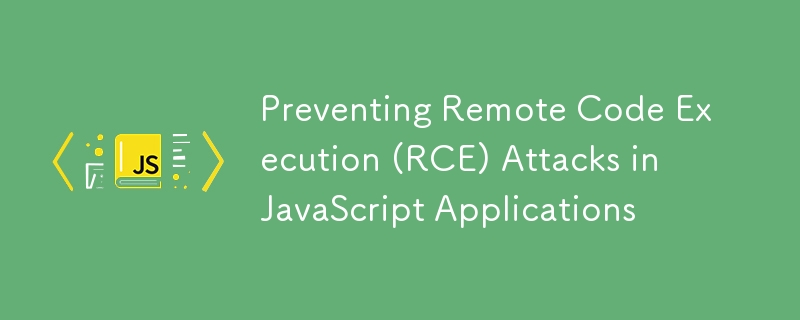

Remote Code Execution (RCE) is a critical vulnerability that allows an attacker to execute arbitrary code on a server or client side. This can lead to severe consequences such as data breaches, system compromise, and unauthorized access. In this blog, we'll explore what RCE is, how it works, and how to prevent it in your JavaScript applications with real-world example code for both client and server sides.
Remote Code Execution (RCE) is a type of security vulnerability that allows an attacker to run arbitrary code on a target machine. This can occur due to various vulnerabilities in the application, such as improper input validation, unsafe deserialization, or flaws in the application logic.
RCE exploits typically involve injecting malicious code into a vulnerable application. This can happen through various attack vectors, including:
Consider a Node.js application that takes user input and executes it using the eval function:
const express = require('express');
const app = express();
app.get('/execute', (req, res) => {
const userCode = req.query.code;
try {
const result = eval(userCode);
res.send(`Result: ${result}`);
} catch (error) {
res.status(500).send('Error executing code');
}
});
app.listen(3000, () => {
console.log('Server running on port 3000');
});
In this example, if an attacker sends a request with a malicious code parameter, they can execute arbitrary JavaScript code on the server:
http://localhost:3000/execute?code=process.exit(1)
1. Avoid eval and Similar Functions:
Avoid using eval, Function, or any other functions that execute code from strings. They are inherently unsafe.
// Avoid this const result = eval(userCode); // Instead, use safer alternatives const safeResult = safeFunction(userCode);
2. Validate and Sanitize Input:
Always validate and sanitize user input. Use libraries like validator to ensure input is clean.
const validator = require('validator');
app.get('/execute', (req, res) => {
const userCode = req.query.code;
if (validator.isAlphanumeric(userCode)) {
// Proceed with safe execution
} else {
res.status(400).send('Invalid input');
}
});
3. Use Secure Deserialization:
Ensure deserialization processes are secure and handle untrusted data safely.
const safeDeserialize = (data) => {
// Implement secure deserialization logic
};
app.post('/deserialize', (req, res) => {
const data = req.body.data;
try {
const obj = safeDeserialize(data);
res.send(obj);
} catch (error) {
res.status(500).send('Deserialization error');
}
});
4. Implement Security Headers:
Use security headers to mitigate certain types of attacks. For example, Content Security Policy (CSP) can help prevent the execution of unauthorized scripts.
const helmet = require('helmet');
app.use(helmet());
app.use(helmet.contentSecurityPolicy({
directives: {
defaultSrc: ["'self'"],
scriptSrc: ["'self'"],
},
}));
5. Regular Security Audits:
Conduct regular security audits and code reviews to identify and fix vulnerabilities.
Remote Code Execution (RCE) is a severe security vulnerability that can lead to devastating consequences. By following best practices such as avoiding unsafe functions, validating and sanitizing input, using secure deserialization, and implementing security headers, you can protect your JavaScript applications from RCE attacks. Always stay vigilant and keep your application security up to date.
The above is the detailed content of Preventing Remote Code Execution (RCE) Attacks in JavaScript Applications. For more information, please follow other related articles on the PHP Chinese website!




